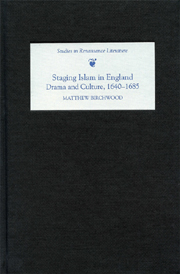Book contents
- Frontmatter
- Contents
- List of illustrations
- Acknowledgements
- Introduction
- 1 Cultural Encounters between England and Islam in the Seventeenth Century: A Topography
- 2 Framing ‘an English Alchoran’: The Famous Tragedie of Charles I and the first English translation of the Qur'an
- 3 Orienting the Monarch: Tyranny and Tragedy in Robert Baron's Mirza and John Denham's The Sophy
- 4 Turning to the Turk: Collaboration and Conversion in William Davenant's The Siege of Rhodes
- 5 Toleration, Trade and English Mahometanism in the Aftermath of Restoration
- 6 Plotting the Succession: Exclusion, Oates and the News from Vienna
- Conclusion: ‘If we our selves, would from our selves exam'ne us’
- Bibliography
- Index
- Studies in Renaissance Literature
3 - Orienting the Monarch: Tyranny and Tragedy in Robert Baron's Mirza and John Denham's The Sophy
Published online by Cambridge University Press: 12 September 2012
- Frontmatter
- Contents
- List of illustrations
- Acknowledgements
- Introduction
- 1 Cultural Encounters between England and Islam in the Seventeenth Century: A Topography
- 2 Framing ‘an English Alchoran’: The Famous Tragedie of Charles I and the first English translation of the Qur'an
- 3 Orienting the Monarch: Tyranny and Tragedy in Robert Baron's Mirza and John Denham's The Sophy
- 4 Turning to the Turk: Collaboration and Conversion in William Davenant's The Siege of Rhodes
- 5 Toleration, Trade and English Mahometanism in the Aftermath of Restoration
- 6 Plotting the Succession: Exclusion, Oates and the News from Vienna
- Conclusion: ‘If we our selves, would from our selves exam'ne us’
- Bibliography
- Index
- Studies in Renaissance Literature
Summary
HISTORICAL TYRANTS HAD long been stock villains of English drama, and a particular fascination with Oriental tyrants of one kind or another may be traced back to Marlowe's Tamburlaine and beyond. As Rebecca Bushnell has noted, the early seventeenth century witnessed a spate of tyrant plays that points to contemporary anxiety at the projection of James' absolutist prerogative:
In representing tyranny, tragedy thus more often confuses rather than supports the antithesis between king and tyrant. On one level, tyrant tragedy brings out the contradictions at the heart of the Humanist formulation of the tyrant's theatricality. In his acting the tyrant is paradoxically powerful and vulnerable …
This formulation and the identification of an inherently fissured form of tragedy provides a suggestive context for another strand of historical precedent customarily deemed to be outside the humanist tradition. Alongside classical European sources, episodes in Islamic and particularly Ottoman history emerge as increasingly prominent analogues for dramatic treatments of sovereignty. Moreover, as we might expect, as dissatisfaction at Charles' personal rule grew in the 1630s, so interest in the nature and history of tyranny intensifies both within and outside the drama. In his study of the period immediately preceding the Civil War, Theatre and Crisis 1632–1642, Martin Butler makes a compelling case for the increasing politicisation and dissidence of theatre in the last decade of pre-war Caroline theatre up until the point when ‘parliament went to war on the king in 1642, the stage fell with the monarchy and remained inhibited until the court's return eighteen years later’.
- Type
- Chapter
- Information
- Staging Islam in EnglandDrama and Culture, 1640–1685, pp. 69 - 95Publisher: Boydell & BrewerPrint publication year: 2007



